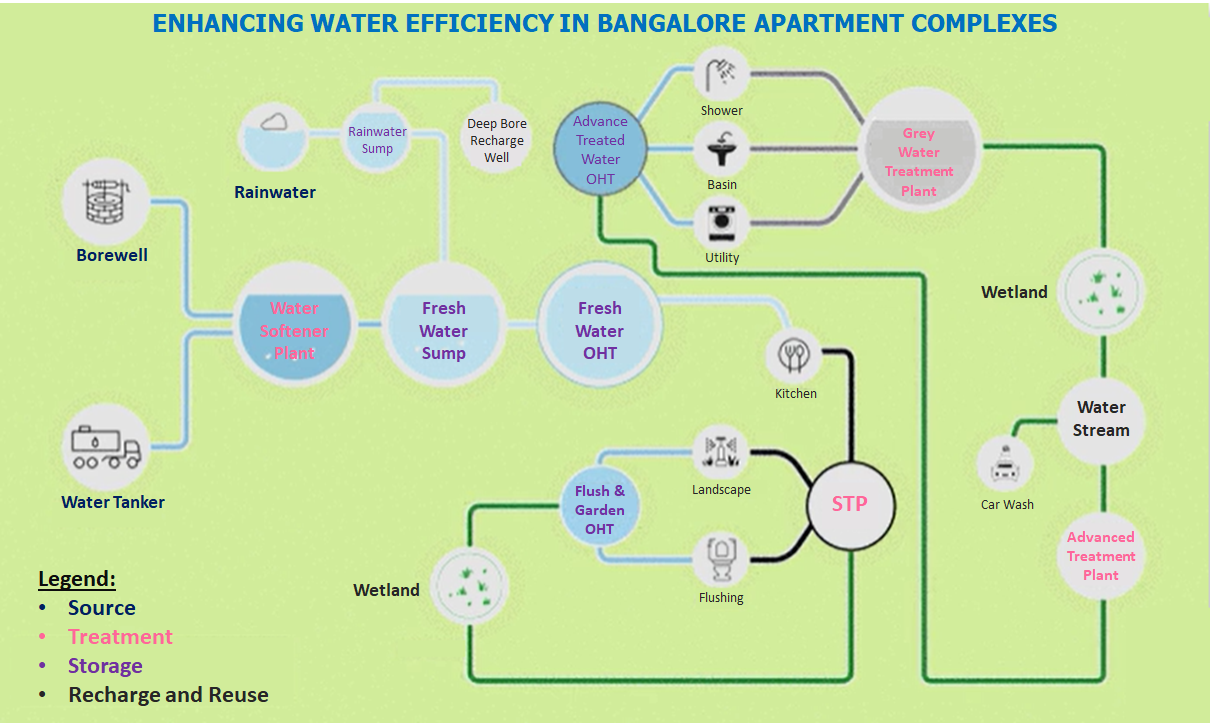Enhancing Water Efficiency in
Bangalore Apartment Complexes
A Sustainable and Cost-Effective Approach
Water efficiency involves optimising the use of water to achieve the desired outcome while minimising waste. In Bangalore's apartment complexes, this concept can be applied to various aspects, including water sourcing, distribution, consumption, and wastewater treatment.
Bengaluru is staring at an acute water crisis within the next decade. Currently, the demand for water for human consumption exceeds 2,100 million litres per day (MLD). Of this, ~1,470 MLD is supplied from the Cauvery River through the efforts of the Bangalore Water Supply and Sewerage Board (BWSSB). The deficit of 630 MLD is met through borewells and water tanker deliveries. By 2031, water demand is projected to jump to 5,340 MLD in the city to serve a projected population of over 20 million. Of this, 3,920 MLD will be needed for domestic use, according to the Revised Master Plan 2031 for Bengaluru.

Positive Environmental Impact
-
Conservation of Water Resources: Water efficiency measures, such as rainwater harvesting and optimised usage, help in conserving Bangalore's limited water resources, reducing the strain on groundwater and pumping of Kaveri water from 100 kms away.
-
Reduced Wastewater Discharge: Implementing Sewage Treatment Plants (STPs) and recharge pits allows for responsible treatment of wastewater and replenishment of the water table, preventing contamination of natural water bodies.
-
Lessened Energy Consumption: Reduced water usage results in lower energy requirements for water pumping, treating, and heating, contributing to lower carbon emissions and energy conservation
Economic Benefits
-
Lower Operating Costs: Efficient water management significantly lowers utility bills for apartment complexes, freeing up funds for essential maintenance and amenities.
-
Revenue Generation: Smart metres and charging per usage allow for fair billing, potentially generating additional revenue to cover water-related expenses.
-
Increased Property Value: Apartments with advanced water-efficient systems and practices tend to be more attractive to buyers and renters, potentially increasing property values and occupancy rates.
Actions for Management Committees
-
Rainwater Harvesting: Invest in rainwater harvesting systems to capture and store rainwater for non-potable uses such as landscape irrigation and flushing toilets.
-

-
Smart Metres: Install smart water metres to accurately measure individual water consumption and charge residents based on actual usage, promoting responsible water usage.
-
Leak Detection and Repair: Regularly inspect and promptly fix leaks in plumbing systems to prevent water loss and avoid costly damage.
- Sewage Treatment Plants (STPs): Implement STPs to treat wastewater within the complex, ensuring responsible disposal and reducing the burden on public sewage systems.
-
Recharge Pits: Create recharge pits to facilitate the infiltration of treated wastewater into the groundwater, helping recharge the water table.
-
Awareness and Education: Organise awareness campaigns and workshops for residents to promote water-efficient practices and responsible water usage.
Actions for Residents
- Water-Efficient Fixtures: Replace older fixtures with water-efficient alternatives, such as low-flow faucets, showerheads, and toilets, to reduce water wastage within apartments.
- Leak Detection and Repair: Regularly inspect and promptly fix leaks in plumbing systems to prevent water loss and avoid costly damage.
- Aerators and Flow Restrictors: Encourage residents to install aerators and flow restrictors on faucets to reduce water consumption while maintaining adequate water pressure.

Enhancing water efficiency in apartment complexes in Bangalore is both an environmental responsibility and a wise economic choice. It not only contributes to sustainable water management but also yields significant financial benefits for both management committees and residents. By taking proactive steps today, apartment complexes can ensure a sustainable and prosperous future for Bangalore, incorporating rainwater harvesting, smart metres, water-efficient fixtures, leak prevention, STPs, and recharge pits to optimise water usage and promote responsible stewardship of this invaluable resource.



